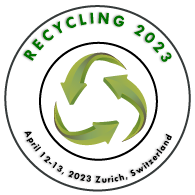Electric Vehicle (Ev) Batteries Circular Economy
More natural resources will be required by the automotive industry if lithium-ion batteries are to be widely utilised in electric vehicles. Battery demand is expected to expand quickly, which could lead to new resource shortages and supply-chain issues. Techniques from the circular economy are needed to increase the resiliency and sustainability of automotive supply chains while simultaneously lowering the demand for primary resources. Material flow analysis is used to better understand past, present, and future fluxes of cobalt found in electric vehicle batteries throughout the European Union. The most promising possibilities for considerably lowering cobalt reliance appear to be new technologies; nonetheless, they may lead to burden shifting, such as an increase in nickel consumption. Technology developments must be combined with social change to prevent this
Related Conference of Electric Vehicle (Ev) Batteries Circular Economy
Electric Vehicle (Ev) Batteries Circular Economy Conference Speakers
Recommended Sessions
- Bioremediation
- Challenges in Plastic Waste Collection and Segregation
- Cylindrical Plastic for Packaging
- E-Waste
- Electric Vehicle (Ev) Batteries Circular Economy
- Innovation & Technology in Plastics Recycling
- Management and Recycling of Waste
- Physical & Chemical advanced Recycling
- Plastics Recycling Opportunities and Challenges
- Recovery of Thermal Waste
- Recycling Chemical Waste
- Recycling Industrial
- Recycling of Food and Agricultural Waste
- Recycling of Metal
- Recycling of Paper
- Solid Waste Management
- Start-up Showcase,
- The Bio-Electrochemical Treatment System is on
- The Bioplastics
- Treatment of Waste Water

